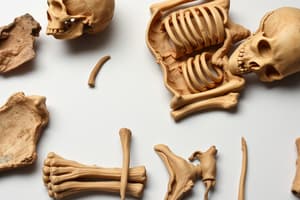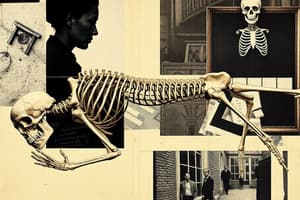Podcast
Questions and Answers
What can a forensic anthropologist potentially determine using physical markers present on a skeleton?
What can a forensic anthropologist potentially determine using physical markers present on a skeleton?
- Family history, mental health status, blood type, and allergies
- Diet, occupation, geographic location, and lifestyle
- Age, sex, stature, and race (correct)
- Cause of death, time of death, place of death, and manner of death
In what legal setting does forensic anthropology find application?
In what legal setting does forensic anthropology find application?
- Identification of deceased individuals with unrecognizable remains (correct)
- Assisting in archaeological excavations
- Conducting research on ancient civilizations
- Identification of missing persons in non-legal settings
Apart from forensic anthropologists, which professionals commonly testify in court as expert witnesses?
Apart from forensic anthropologists, which professionals commonly testify in court as expert witnesses?
- Medical examiners, forensic archaeologists, and forensic entomologists
- Forensic pathologists, forensic dentists, and homicide investigators (correct)
- Toxicologists, ballistics experts, and crime scene analysts
- Psychologists, sociologists, and criminologists
What is one of the key roles of forensic anthropologists in the investigation and documentation of genocide and mass graves?
What is one of the key roles of forensic anthropologists in the investigation and documentation of genocide and mass graves?
What can forensic anthropologists potentially determine using skeletal abnormalities?
What can forensic anthropologists potentially determine using skeletal abnormalities?
Flashcards are hidden until you start studying
Study Notes
Forensic Anthropology Insights
- Forensic anthropologists assess skeletal remains to determine age, sex, ancestry, stature, and trauma, providing critical information about the individual.
- Physical markers on bones, such as dental records and growth patterns, can help identify the deceased and unravel their life history.
Legal Applications
- Forensic anthropology is utilized in criminal and civil cases, providing expert testimony in court to clarify findings from skeletal examinations.
Expert Witnesses
- Besides forensic anthropologists, other professionals such as forensic pathologists, toxicologists, and crime scene investigators frequently serve as expert witnesses in legal proceedings.
Role in Genocide and Mass Graves
- Forensic anthropologists play a vital role in the identification and documentation of human remains in cases of genocide and mass graves, helping to gather evidence for potential war crimes and human rights violations.
Skeletal Abnormalities Analysis
- Analysis of skeletal abnormalities can reveal information about previous injuries, diseases, and physical conditions, contributing to understanding the individual's health and lifestyle prior to death.
Studying That Suits You
Use AI to generate personalized quizzes and flashcards to suit your learning preferences.





